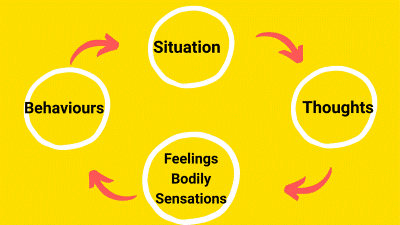Keeping your children safe in an online world

The internet has opened up a magical world, gifting us with literally everything we need at the touch of our fingers. However, it's also an extremely dangerous place, especially for vulnerable children and teens. Here's how to keep them safe.
The dangers of life online are far broader than most adults can fathom, according to Dean McCoubrey, founder of MySociaLife, a company with global reach that trains children and teens - as well as their parents and educators - on how to be safe in the often murky waters of the cyberworld. "This is not fearmongering," he says, "It's simply a fact because we don't join the dots about the level of safety or exposure for young minds in such a diverse pool of risk".
What are the biggest threats?
The threats are everywhere, explains Dean. "Some are visible such as cybersecurity threats (phishing and clickbait). Some are invisible such as the erosion of self-esteem by comparing yourself to others. Some are self-created such as sexting, and some are a consequence of a bad decision - sextortion, for example, when kids are bribed or extorted for money around the sharing of sexual images. In other words, there are so many moving parts here when it comes to living a life online (being hacked, identity theft, anxiety, self-harm, pornography) that there's a vast new world for parents to understand. I'm not sure that many of them realise this."
The unseen dangers of the online world
Dean believes the biggest problem for vulnerable children and teens is invisible influence. "In a world of fake news, porn, aggressive behaviour and pack behaviour online, it's easy to mirror or follow what you see. Furthermore, social media platforms are serving you content based upon what you've clicked on before and other information related to your age, gender, preferences etc. So this means that there's also the potential to live in a vacuum and it can narrow your view unless you are aware".
What is cyberbullying?
Cyberbullying is bullying that occurs over digital devices (cellphones, tablets and computers) by SMS, for example, or online through social media. Dean says cyberbullying is one of the biggest challenges at schools together with mental health and sexting, and sextortion and porn-based challenges. "This is because kids (and actually most adults) are unaware of their own insecurities and fears or experiences of bullying, so we act out too. It's very tricky," he adds, "And because there are so many nuanced forms of cyberbullying online, it's hard to explain or report them."
What to look out for
The warning signs are incredibly diverse and really depend on a child's mental wellbeing, says Alexa Scher, clinical psychologist and mental health consultant for MySociaLife. "Mental health is the interaction between thoughts, feelings or bodily sensations, and behaviour", she explains.

"The situations that children are exposed to online can trigger a host of different and difficult thoughts. What parents need to understand is that young people's brains are still developing, so they don't have the capacity to reflect on their thoughts critically. They also don't have the capacity to realise that just because they're thinking something that specific thought isn't necessarily true and is most likely very biased. So what children perceive to be reality online is obviously far from reality most of the time."
The signs of loss of self-worth
Alexa explains that children's social lives are largely in the online space and these contexts are designed to release dopamine as soon as there's a 'like' or a 'ping'. This is done to manipulate the users to stay on the apps or platforms. "This can result in children's sense of self-worth becoming dependent on external validation, losing the ability to balance this out with internal validation. Being liked by others has become more important than liking themselves, which can be dangerous for mental health."
Alexa says parents can monitor their child's mental health wellbeing by paying attention to their:
- General moods and ability to regulate their emotions. Are they becoming very overwhelmed or distressed by their emotions and unable to maintain control over their behaviour when experiencing a difficult emotion?
- Beliefs about themselves. Are they fair and realistic, or are they very biased (eg only focussing on what they're not good at, while ignoring the things about themselves that are good)?
- Feelings: It's essential for them to share them; if not with you then someone they are comfortable with.
- Behaviour. Children naturally go through big changes in adolescence, but take note of significant changes in how they relate to themselves, the activities they used to care about and their family and friends.
- Words. Never dismiss your child's expression of hopelessness or pain as them simply being dramatic - pay attention!
How to help your child become cyber aware
Dean insists the only way to keep your child cybersafe is through education - and this involves educating parents and teachers too. "It's essential to empower them with digital life skills: for example, what to do when exposed to catfishing. Here people use fake profiles to pretend to be someone else and dupe someone into trusting them or sharing with them until they find themselves in danger, at risk or exposed. So we teach kids about the things to look out for including 'reverse image search', which will reveal if the photo of the catfisher is actually a fake and has been used by someone else in the past.""
Alexa offers the following safety tips:
- Listen; don't lecture. Simply telling your child to not think the way they're thinking and to listen to what you think instead isn't going to work. Rather listen to them, before adding your opinions.
- Don't say "just think positively" - if they could, they probably would. It's more helpful to teach your kids that they can control what thoughts they pay attention to or not.
- Have conversations about how what they view online impacts how they view themselves, others and the world. Explore with them the ways life online can bias us, and how algorithms on social media platforms can manipulate people on a wide scale.
- Provide your child with healthy ways to express difficult thoughts and feelings with no judgment. The more they can express themselves, the more in control they can be.
- Open up the space to share difficult thoughts and feelings at home. Keep in mind that it's not always about needing to fix or correct, but rather about having a safe place just to be listened to with full attention.
- Ask your child what they need instead of trying to figure out what you think is best for your child. Then try come up with plans together to support them with what they are going through.
- Don't threaten to confiscate devices if they do something wrong. This will just result in them not telling you when something has happened, as they will fear being cut off from their world.
Keep in mind, says Dean, that although parents and teachers think they get it, it's almost impossible to completely understand unless you work in this area. "New trends, apps, challenges, dares, hoaxes and new cybersecurity threats are constantly evolving. This is a dynamic daily landscape, and our children are living fast and furiously inside this new popular culture and dangerous world. So if you want your child to be supported, you need a multipronged approach, driven by schools and educators in the field. This is a tightrope walk," he concludes, "And listening - not patronising - is the key to success."